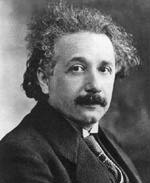This discussion leads to several interesting points:
- In a stable universe (one that is not expanding), filled with stars, a dark night sky is not possible (example).
- As scientists learned more about the physics of matter and energy (thermodynamics), they realized the dark night sky contradicted their new knowledge.
- New scientific theories are judged in several ways. For example, a theory might create new problems to be solved, be neutral, or it might solve unrelated problems. Here are some of the problems "solved" by the Big Bang Theory:
- It provides a reason for the recession of the galaxies, the "Red Shift."
- It provides an explanation for Olbers' Paradox.
- It explains a quirk in Einstein's Relativity Theory.

Albert Einstein
This last point deserves elaboration. When Albert Einstein developed his Relativity Theory, he saw a problem right away — the universe described by his equations was unstable. It relied critically on the density of matter — if the density was above a certain critical value, the universe would begin to fall in on itself, which would increase the density further, leading to a runaway collapse. If the density was below this critical value, the opposite would happen — the universe would expand forever. Einstein's equations didn't permit a stable universe.
Einstein therefore added a term to his equations — a "cosmological constant" — that would counter the effect of gravity at great distances and balance the universe. Einstein was not happy with this constant — it had no obvious physical explanation, it seemed ad hoc, but he saw it was necessary so that his equations could describe the universe that was known at the time. This was before the work that led to the Big Bang Theory, which made the cosmological constant unnecessary. Einstein later called the cosmological constant the "biggest mistake of my life."
Einstein could simply have said, "Oh well, your knowledge of the universe is not good enough for my equations — you need to look more carefully through your telescopes," but this was too much even for Einstein, known for his occasional bold pronouncements. He thereby missed his chance to predict an expanding universe.
Now you know why the sky is dark at night. — P.L., Ashland, Oregon


 Share This Page
Share This Page

 Share This Page
Share This Page

 Share This Page
Share This Page